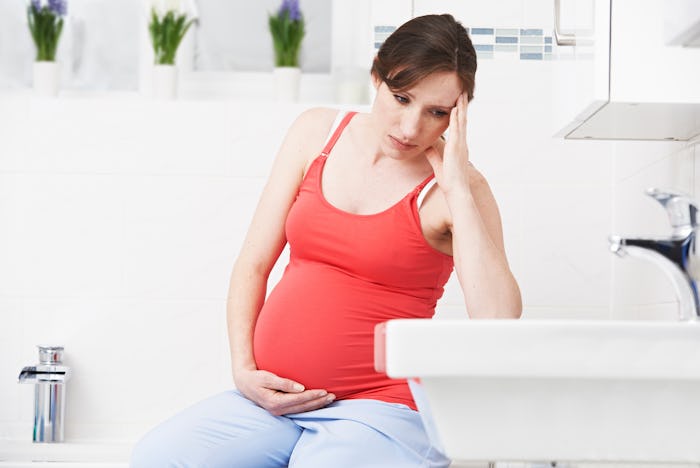Life

7 Things You Didn't Realize Are Signs Of Hyperemesis Gravidarum
Although many moms-to-be are able to bypass morning sickness, it's considered a rite of passage for pregnancy. And, in most cases, it's an issue that subsides as your pregnancy progresses and becomes a memory of those early weeks. Unless you have hyperemesis gravidarum. You've probably heard that this condition is characterized by consistent vomiting throughout the entire pregnancy, but there might be some other things you didn't realize are signs of hyperemesis gravidarum and it's always best to stay educated.
According to What to Expect, hyperemesis gravidarum occurs in less than one in 200 pregnancies, but it can be seriously debilitating. Severe cases can lead to dehydration, electrolyte imbalances, weight loss, and malnutrition. Some moms with hyperemesis gravidarum even have to be hospitalized in order to receive IV fluids.
The American Pregnancy Association (APA) noted that there actually may be more cases of hyperemesis gravidarum in the country than recorded as a lot of moms are able to self-treat at home. But that doesn't make it any less difficult to deal with. It can be a very serious condition with dangerous consequences, so it's best to know the symptoms of it so you can get yourself help if needed.
But how do you know if your puking is just morning sickness or a case of hyperemesis gravidarum? These seven things you didn't realize were signs of it are also pretty normal pregnancy symptoms, but when combined with consistent puking, it could be a diagnosis for hyperemesis gravidarum.
1Your Nausea Doesn't Subside
Everyone talks about feeling nausea throughout their pregnancy, right? But if you have nausea that doesn't subside, no matter what, it might be time to pay attention. The American Pregnancy Association listed nausea that doesn't subside after your standard 12 weeks of pregnancy as a sign of hyperemesis gravidarum. Remember, it's nausea that can't be controlled. If it's only hitting you first thing in the morning or when you smell a certain scent, you're most likely OK.
2You Have Serious Food Aversions
Cooked ground beef was a big trigger for me when I was pregnant — I could barely stomach the smell or taste. It's not abnormal for a pregnant woman to have an aversion to a certain food, but a study in the Journal of Women's Health found that food aversions were often reported by women with hyperemesis gravidarum. In fact, the symptom stuck around in the postpartum period.
3You Suffer From Headaches
Another big pregnancy symptom, but also a potential sign of hyperemesis gravidarum. Whether they are happening because you're dehydrated or straining so much when vomiting, the APA reported that headaches can also be a sign of hyperemesis gravidarum.
4You've Fainted
I have only ever fainted once in my life, and everyone's main concern was that I was dehydrated. Because of this, fainting is also considered a symptom of hyperemesis gravidarum by the U.S. National Library of Medicine. This can be incredibly serious, especially if you're hurting yourself when you faint, so be sure to talk to your doctor immediately.
5You Feel Dizzy & Lightheaded
According to the Cleveland Clinic, feeling dizzy and lightheaded may be a sign of hyperemesis gravidarum, especially if you're consistently vomiting and/or battling nausea. Take note of this symptom in case it leads to fainting.
6You're Salivating More Than Usual
You know that feeling where your mouth fills with saliva right before you're about to vomit? The U.S. National Library of Medicine reported that salivating more than usual can be a sign of hyperemesis gravidarum. Even if you're not vomiting every time it happens, it's worth noting to your doctor how you feel.
7You're Constipated
Baby Center noted that constipation is a common problem in pregnancy and often due to hormones affecting your digestive tract. But do you know what else causes constipation? Dehydration. According to research in the European Journal of Clinical Nutrition, mild dehydration could cause constipation, which means dealing with hyperemesis gravidarum can leave you feeling a little backed up, thanks in part to the dehydration and hormones from pregnancy. The U.S. National Library of Medicine listed constipation as a possible symptom of hyperemesis gravidarum, so be sure to discuss with your doctor any issues surrounding it.